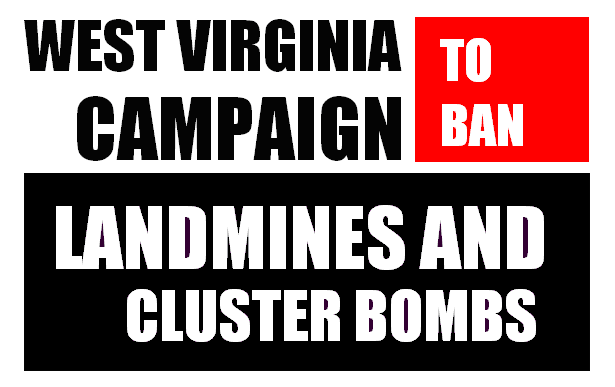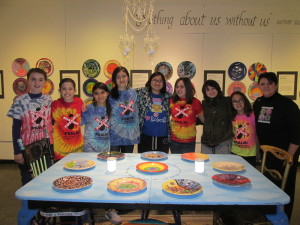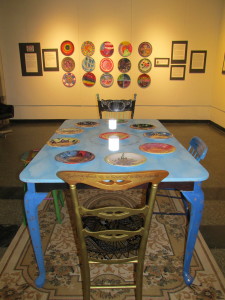- PSALM students A PLACE AT THE TABLE
Join PSALM students at the MONONGALIA ARTS CENTER in Morgantown, West Virginia for “A PLACE AT THE TABLE”, A LOOK AT THE INTERNATIONAL CAMPAIGNS TO BAN LANDMINES AND CLUSTER MUNITIONS AND HOW THE CAMPAIGNS ADDRESS THE NEED OF SURVIVORS from February 5th-27th, 2016. “A PLACE AT THE TABLE”, is recognition of the importance of victim assistance in the Ottawa Treaty and the Convention on Cluster Munitions and the theme of The International Day of Persons with Disabilities/ Inclusion Matters: access and empowerment for people of all abilities.
PSALM students have displayed sculptural “tables” with hand-painted plates representing the needs of people with disabilities and the important efforts to meet those needs. Also displayed are photos from Cambodia, Laos, Jordan and Bosnia. Other items like maps, graphs and printed materials were used to educate the public about our work. Students have made a slide presentation to share with the public on the importance of Victim Assistance and Survivor Issues.
A PLACE AT THE TABLE: A table is where people come together for nourishment, both physical and emotional. A table is where people meet to make decisions—in neighborhoods, nations, and the global community. “A place at the table” is a saying referring to a reserved place for someone to sit at a table; an all-inclusive invitation to all. Yet in many impoverished or developing countries, it is difficult for the disabled to find “their place” at the table. The difficulties include finding work, being able to feed their families, educate their children, secure health care, or find adequate housing. Their voices and needs are often ignored or dismissed. Contamination from landmines, cluster munitions and other explosive remnants of war terrorizes civilians in more than half of the world’s countries and are a significant cause of disability. These weapons instill fear in whole communities, deepening poverty and act as a lethal barrier to development. Victim assistance is a very important part of the treaties to ban landmines and cluster bombs. Countries that are party to the treaties have the responsibility and obligation to ensure rights of landmine victims are protected and their needs are met.
Assist the victims: “NOTHING ABOUT US WITHOUT US”
Survivors of landmine and cluster bomb explosions, as well as their families and communities, played a key role in the adoption of the Mine Ban Treaty and the Convention on Cluster Munitions. We must now complete the task of ensuring that all victims of landmines, cluster munitions and other explosive remnants of war see their needs fulfilled and their rights respected. This work includes:
- Ensure the participation of survivors in the planning, implementation, monitoring, and evaluation of victim assistance.
- Assign a focal point in charge of victim assistance, with the authority and adequate resources to carry out his/her task.
- Collect comprehensive and accurate data about the number, situation and needs of victims, and about the availability of services. Share this data with all relevant stakeholders.
- Ensure national laws & policies are aligned with the Mine Ban Treaty, Convention on Cluster Munitions & Convention on the Rights of Persons with Disabilities
- Develop a national action plan with a budget and timeline, which is integrated with broader efforts in the areas of disability, development and human rights.
- Work towards the full availability, accessibility and affordability of victim assistance services, in all areas where victims live, including rural and remote areas.
- Ensure long-term and adequate financial, human and technical resources are available. Allocate national resources and seek international support. Contribute to enhancing the capacity of all actors, including implementing agencies, organizations of disabled persons and NGOs.
- Monitor and evaluate the implementation of victim assistance and provide reports every year. Donors should report on the actual impact of their support on victims’ lives, especially when financial support is not specifically dedicated to VA but is channeled through the health or development sectors.
- Create and/or disseminate standards, accessibility guidelines and information on good practices.
- Inform survivors about their rights and the availability of services. Raise awareness within the general public about the need to combat stereotypes about persons with disabilities.




One reply on ““A PLACE AT THE TABLE” PSALM Photo and Art Exhibit”
great work, students!